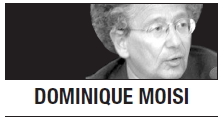PARIS ― China may be just a few years away from becoming the world’s leading economic power, and America’s strategic centrality may be on the wane (certainly, no one speaks of the United States today as the world’s “hyperpower”). But America still makes people dream, and its emotional hold on the world remains unique.

In this sense, last week brought two victories: not just Barack Obama’s over Republican challenger Mitt Romney in the presidential election, but also the victory of America’s democratic system over China’s one-party authoritarianism. In a few sentences of his victory speech ― the space of a magic moment ― Obama celebrated “the mystery of democracy” in a very concrete, but also nearly religious manner.
Obama found the right words with which to pay tribute to the multitude of anonymous citizens going door to door to convince their fellow Americans to vote for their preferred candidates. He was describing democracy at its best, its most noble, as it should be, but not always is: freely mobilized men and women able and willing to change the course of their destiny.
At this moment, however brief, America’s soft power defeated by a knockout that of China, which less than one day later solemnly ― and in the most opaque manner ― opened the 18th Congress of the Chinese Communist Party. Millions of people around the world would rather experience for themselves an election night like America’s than become a part of China’s long-term plans.
Of course, America is no longer what it used to be. It is far too indebted to be the ultimate strategic and economic insurance policy for its allies, as it was in the past. But, if America’s protective power has receded, its power to inspire remains unique and can still redound to its benefit in the most spectacular way.
Obama’s victory was not only that of democracy, but also of a certain vision and message of America. By keeping an open stance on immigration, maintaining a respectful discourse toward all who want to live out their differences freely, and considering women in a modern and dignified manner, Obama was able to mobilize the strength of America’s exceptionalism, which rests on one key word: diversity.
In deliberately ignoring this diversity and embracing nostalgia for a long-gone past, the Republican Party ― led astray by its ultra-conservative lunatics ― was far more responsible than its decent candidate for the defeat. Romney’s mistake was to align himself for too long with ideas that were too radical for him ― and for America.
The fate of Romney’s candidacy contains a universal message for all democratic regimes: One wins nothing by cultivating the extremes or by becoming their captive. In fact, one runs the risk of losing not only one’s soul, but also elections. That was Nicolas Sarkozy’s fate in France: he was defeated after losing the support of the center of the electorate. Obama was reelected because the Republican Party lost sight of the center in America.
Of course, the greatness of America’s democracy should not hide its deep flaws and current dysfunction. The cost of this election cycle surpassed $2 billion ― all to reproduce the status quo: the same president, and the same balance of power in the U.S. Congress. Money has become a corrosive agent that is eroding and redefining the democratic process, with the mobilization of personal energies giving way to the enlargement of campaign budgets.
Beyond the issue of money, there is the problem of a system of checks and balances run amok, leading to governmental paralysis. “Vetocracy” ― reflected in the Republicans’ routine Congressional obstructionism in Obama’s first term ― is a threat to democracy. Will the party, chastened by its electoral defeat, recognize that its responsibility is to the American people, and not only to its members and followers?
Obama’s reelection sends a message, but one that will resonate widely ― including at home ― only if rhetoric does not depart from reality, as was too often the case during Obama’s first term. America cannot continue to live with the injustices of its health care system or with crumbling and obsolete infrastructure. Nor can it remain indifferent to the increasingly unacceptable indebtedness of its university students.
At the same time, while America may no longer be the international actor that it once was, domestic production of shale oil and gas appears set to rewrite the U.S. energy equation ― as it could for France and other Western countries, which may one day be able to do without the energy supplied by the Middle East.
America’s main challenge globally is to accept that it will no longer be alone at the top. It has never had to deal with others as equals, unlike traditional European powers, which have done so for centuries.
China’s challenge, however, may be more difficult. It not only has to live with the reality of U.S. power; it must also take into account the American ideal. In 1989, large numbers of Chinese students took over Tiananmen Square to demand more rights, adopting a symbol resembling the Statue of Liberty. Today, too, it is not America’s military strength that threatens or challenges China, but rather the enduring attraction of “the American dream.”
By Dominique Moisi
Dominique Moisi is the founder of the French Institute of International Affairs (IFRI) and a professor at Institut d’tudes politiques de Paris (Sciences Po). He is the author of “The Geopolitics of Emotion: How Cultures of Fear, Humiliation, and Hope are Reshaping the World.” ― Ed.
(Project Syndicate)








